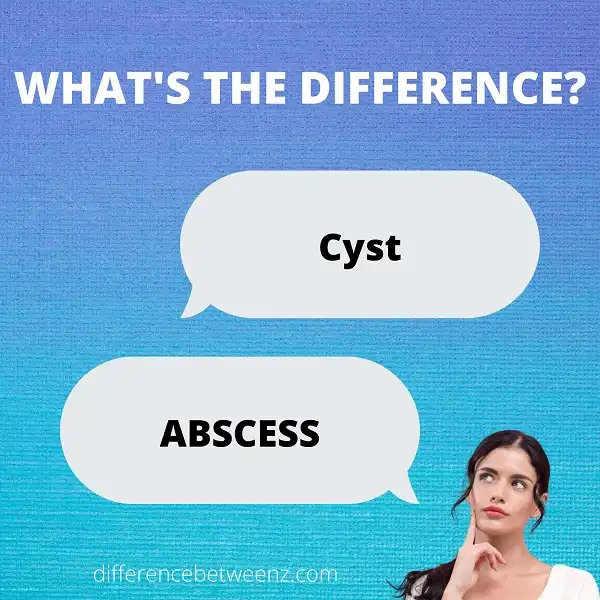If you are like most people, you may not know the difference between a cyst and an abscess. Many people use the terms interchangeably, but there is a big difference between the two. In this blog post, we will discuss the differences between cysts and abscesses, including what causes them and how they are treated. We will also provide some tips on how to prevent cysts and abscesses from developing. So, if you want to learn more about cysts and abscesses, keep reading!
What is Cyst?
- A cyst is a sac or capsule that contains fluid, pus, or other material. Cysts usually form within tissues and can be caused by infection, trauma, tumor growth, or abnormal cell development. Most cysts are benign, meaning they are not cancerous. However, some cysts can become cancerous over time. Cysts can occur anywhere on the body, including the skin, ovaries, breasts, and brain. Cysts range in size from very small to large enough to cause visible bulging or distortion of the affected area.
- Cysts may cause no symptoms or may cause pain, swelling, redness, or changes in appearance. Treatment for a cyst depends on the type and location of the cyst as well as the symptoms it is causing. Treatment options include aspiration (removal of fluid from the cyst), surgery, medications, or watchful waiting. Cysts that are not causing any symptoms often do not require treatment.
- Aspiration is usually the preferred treatment for symptomatic sebaceous cysts that are located on the face or neck. Surgery is typically recommended for larger cysts that do not respond to aspiration. Cystic tumors of the brain are usually treated with surgery followed by radiation therapy or chemotherapy.
What is Abscess?
An abscess is a localized collection of pus that results from the body’s response to an infection or foreign substance. The pus is composed of dead tissue, white blood cells, and bacteria. Abscesses can occur anywhere on the body, but they are most common on the skin, in the lungs, and in the gut. When an abscess is present, there may be redness, swelling, and pain at the site.
Abscesses are typically treated with antibiotics and drainage. Surgery may also be necessary to remove the pus and dead tissue. In some cases, abscesses may resolve on their own without treatment. However, untreated abscesses can lead to serious complications, such as sepsis or organ damage. Therefore, it is important to seek medical care if you think you may have an abscess.
Difference between Cyst and Abscess
- Cysts and abscesses are both types of lesions or areas of abnormal tissue. Cysts are non-inflammatory, closed sacs that may be filled with air, fluid, or pus. Cysts can form anywhere on the body, including the skin, ovaries, and breasts. Cysts are usually benign, but they can become cancerous. Abscesses are inflammatory lesions that are filled with pus.
- They often form at sites of infection, such as the tonsils, gums, or digestive tract. Unlike cysts, abscesses are always considered medical emergencies. Both cysts and abscesses can cause pain and swelling. Cysts can also rupture, which can lead to infection. If an abscess ruptures, it can spread the infection throughout the body. Cysts and abscesses should both be evaluated by a doctor.
- Treatment typically involves antibiotics for abscesses and drainage for both cysts and abscesses. Surgery may also be necessary to remove either type of lesion. Cysts and abscesses are both types of lesions or areas of abnormal tissue.
Conclusion
Cysts and abscesses are both common types of infection that can occur in any part of the body. While they may look similar, there is a big difference between these two types of infections. In general, cysts are less serious than abscesses, but it is important to know the differences so you can get the right treatment.


